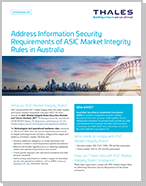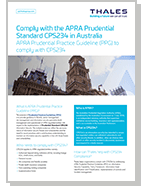Data Security Compliance with ASIC Market Integrity Rules in Australia
Thales helps organizations address Information Security Requirements for the market participants.

ASIC introduced the ASIC Market Integrity Rules (Securities Markets and Futures Markets) Amendment Instrument 2022/74 which amends the ASIC Market Integrity Rules (Securities Markets and Futures Markets) 2017. The amendments can be found in Report 719: Response to submissions on CP 314 Market integrity rules for technological and operational resilience.
The Technological and operational resilience rules commence on 10th March 2023 which set minimum expectations and controls to mitigate technological risks and help to safeguard the integrity and resilience of Australia’s markets.
With extensive experience helping organizations comply with compliance mandates, Thales helps organizations comply with ASIC Market Integrity Rules by addressing Information Security Requirements.
Regulation Overview
The Technological and operational resilience rules of ASIC Market Integrity Rules (Securities Markets and Futures Markets) Amendment Instrument 2022/74 commence on 10th March 2023, it sets minimum expectations and controls to mitigate technological risks and help to safeguard the integrity and resilience of Australia’s markets. The Rules also:
Who needs to comply with ASIC Market Integrity Rules?
Thales helps market participants to address the Information Security Requirements of ASIC Integrity Rules amendment.

ASIC introduced the ASIC Market Integrity Rules (Securities Markets and Futures Markets) Amendment Instrument 2022/74 which amends the ASIC Market Integrity Rules (Securities Markets and Futures Markets) 2017. The background on the amendments can be found in Report 719:...

The purpose of Prudential Practice Guidelines (PPG) is to provide guidance to Boards, senior management, risk management and information security specialists (both management and operational) of APRA-regulated entities with respect to the implementation of Prudential Standard...

Criminals continue to target consumers’ payment data, and IT security defenses need to keep pace. According to the 2024 Thales Data Threat Report, nearly two-thirds of financial services respondents (64%) report seeing an increase in attacks, versus 49% survey-wide. Notably,...

The Payment Card Industry Data Security Standard (PCI DSS) is an information security standard that provides a baseline of technical and operational requirements designated to protect payment data and reduce credit card fraud.

Perhaps the most comprehensive data privacy standard to date, GDPR affects any organization that processes the personal data of EU citizens - regardless of where the organization is headquartered.

Any organization that plays a role in processing credit and debit card payments must comply with the strict PCI DSS compliance requirements for the processing, storage and transmission of account data.

Data breach notification requirements following loss of personal information have been enacted by nations around the globe. They vary by jurisdiction but almost universally include a “safe harbor” clause.